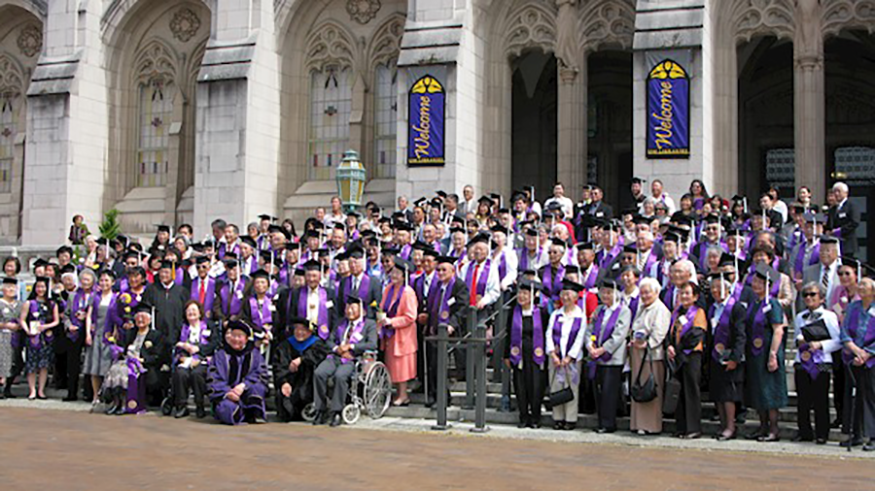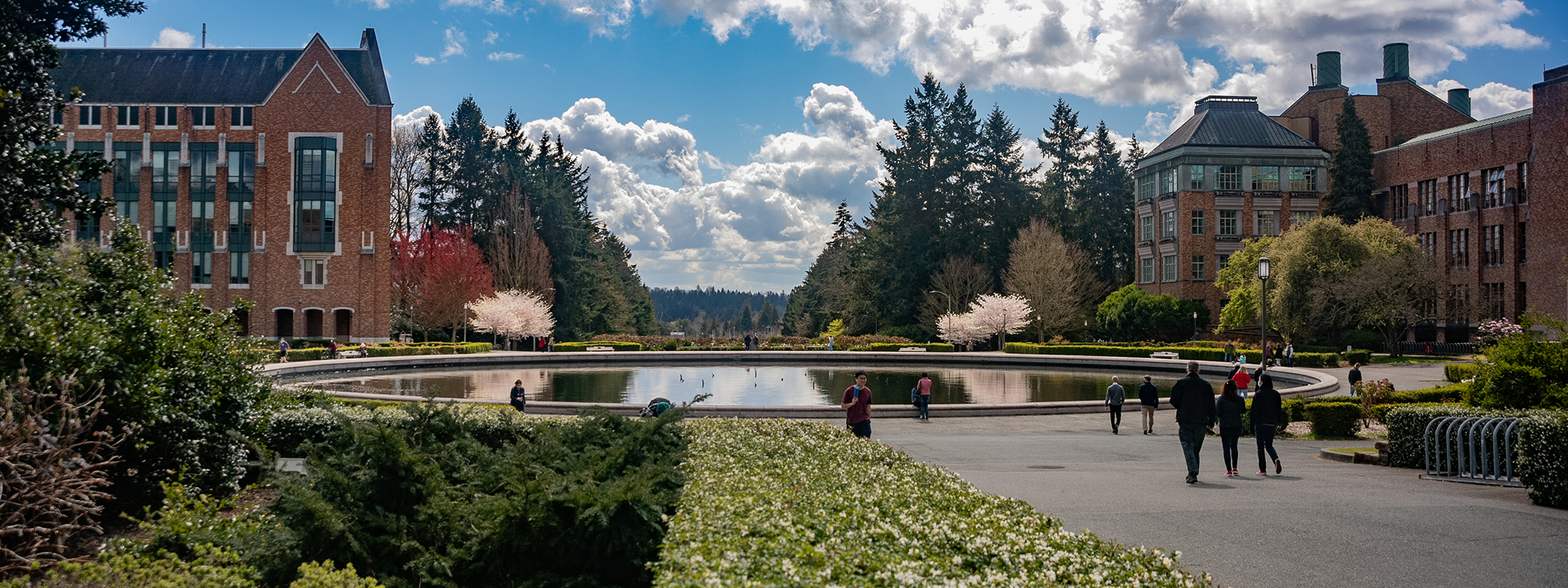
On May 18, 2008, the University of Washington bestowed honorary baccalaureate degrees to 449 Japanese American students from the class of 1941- 42 who, due to Executive Order 9066, were banished from the University campus in early May 1942. This long-overdue ceremony, “The Long Journey Home,” was an inflection point for alumnus Allen Shimada.
“The recognition reinforced my pride in being a Husky,” says Shimada (BS, Fisheries, 1978; MMA, Marine Affairs, 1985). “That was when I first thought that one day it would be possible to show my appreciation to the University.”
Today, Shimada is doing just that by establishing the Long Journey Home Challenge — an endowment that will perpetually support the Department of American Ethnic Studies, enabling it to continue expanding its education opportunities, fostering the next generation of influential and informed citizens.
Shimada was made aware of the incarceration experience of UW Nikkei students after reading “The Stolen Years," a two-part series of articles that appeared in the December 2005 and March 2006 issues of Columns (now called UW Magazine). The articles examined the Nikkei student experience at the UW before Pearl Harbor, the ramifications of Executive Order 9066, and the lives of the Class of 1941-42 following the war.
“The Stolen Years was the first time I saw someone writing about the Japanese American community in the context of the University," says Shimada. "Of course, I understood what happened after Pearl Harbor. But to have an insight into the experiences of being a Japanese American student on campus at that time, being kicked out and going into the internment camps, was eye-opening for me.”
As Shimada dug into stories of the Nikkei student experience at the UW, he realized that he was also unraveling his own family history.
A Family Affair
Shimada’s father Bell and uncle “Mits” were two of the impacted students. Bell, then a senior in the College of Fisheries, was incarcerated in Minidoka, Idaho for two years before volunteering for the 442nd Regimental Combat Team and eventually serving in the Military Intelligence Service. He returned to campus in 1946 and completed course work for his BS and MS degrees, and eight years later returned to earn a Ph.D. Bell died in a 1958 plane crash near Guadalajara, Mexico.

“I did not initially realize that my father was part of that class of students,” Shimada says. “As I went about trying to fill in the blanks of my family's history on my father's side, I realized that our shared community experience is very much interconnected to the University of Washington.”
One such connection? Warren S. Wooster, a physical oceanographer from Scripps Institution of Oceanography, who collaborated with Shimada. After Bell’s passing, Wooster raised money for an education fund that benefited Allen and his sister, Julie. Years later, Allen would have Wooster as a professor at the UW Institute of Marine Studies (now School of Marine and Environmental Affairs) without knowing of Wooster’s earlier connection.
“On the first day of school, Professor Wooster asked me, ‘Are you somehow related to Bell Shimada?’ I was taken aback," Shimada recalls. "I told him yes, that he was my father. And Professor Wooster just said ‘Okay.’ It wasn’t until years after I had completed my degree that I discovered a 1961 letter to our mother, passing on the proceeds of his collection to help pay for my college education."
Another connection is Tetsuden Kashima, professor emeritus and longtime friend of Shimada. Kashima arrived at the University of Washington in 1976 as the inaugural director of the Asian American Studies Program, an early area of concentration that contributed to the formation of the Department of American Ethnic Studies in 1985. Kashima was incarcerated as an infant and later as UW faculty was an early advocate for an annual Day of Remembrance, February 19th, marking President Franklin D. Roosevelt’s signing of Executive Order 9066. His passion ultimately culminated in the UW’s “Long Journey Home” celebration in 2008.
“Over time I realized I could honor all of these connections by creating an endowment campaign," says Shimada. "Although this is part of my story, it’s very much interrelated with the UW stories of so many others."
Supporting the Department of American Ethnic Studies faculty and students is as important now as it ever was.
Third-year AES major Elliot Okimoto agrees.
“Going to college can be about gaining professional skills and knowledge, but it can also be about developing yourself as a human,” they say. “The American Ethnic Studies Department helps you gain a critical understanding of the world that is so central to being a human in a society. I feel like I am a more thoughtful and analytical person because I have a better understanding of how the world around me functions.”
As a first-year student, Okimoto took “American Internment and Incarceration: Race, Discrimination, and Power” with Professor Vince Schleitwiler. To get extra credit for the course, they attended the Nikkei Student Union’s (NSU) annual Day of Remembrance in 2020. They remember seeing Tsuru for Solidarity at the event, a group of Japanese American social justice advocates and allies working to end detention sites.
“It highlighted for me that there are Nikkei people out there organizing and advocating, who care very deeply about very important issues and are using their connection to identity to advocate for change that they want to see in the world,” Okimoto says

Okimoto's experiences in the American Ethnic Studies Department and NSU have also helped them connect to their personal identity as Japanese American in a new way.
“There is a very specific experience of being Japanese American, of having elders who were incarcerated, having elders who immigrated but don't speak Japanese anymore," says Okimoto. "There's so much cultural knowledge that I didn't have access to that I felt was preventing me from being truly 'Japanese.' And then coming here I saw that there are people living in the exact same space as me, doing really cool things with it that I want to do. I think changing how I view and construct my identity has been empowering.”
Today, Okimoto serves as the coordinator for the NSU’s Day of Remembrance. Over 100 people from the UW community and beyond attended this year’s event, which took place at wǝɫǝbʔaltxʷ – Intellectual House.
We wanted to be intentional about our space for the event and the interconnected histories of Japanese and Indigenous Americans.
“A lot of the incarceration camps were built on Native land that was being trespassed upon by the federal government in ways that completely disregarded legal ownership," says Okimoto. "There are stories from elders about finding arrowheads at the camps and about learning about the native medicinal plants."
Okimoto says that support for the American Ethnic Studies Department is vital for the entire UW community.
“American Ethnic Studies is a critically necessary discipline," they say. "I think this endowment will help the department continue to invest in its people and bring knowledge back to the community. Isn't that what academia should be used for?”
To learn more and support the Long Journey Home Challenge, please visit the Together UW page.
Author’s note: The terms “incarceration” and “internment” are used interchangeably in this story and in interviews. For more information about the history of terminology surrounding the incarceration of Japanese Americans, please visit densho.org.
More Stories

Finding Love at the UW
They met and fell in love as UW students. Here, 10 alumni couples share how they met, their favorite spots on campus, and what the UW still means to them.

AI in the Classroom? For Faculty, It's Complicated
Three College of Arts & Sciences professors discuss the impact of AI on their teaching and on student learning. The consensus? It’s complicated.

What Students Really Think about AI
Arts & Sciences weigh in on their own use of AI and what they see as the benefits and drawbacks of AI use in undergraduate education more broadly.
